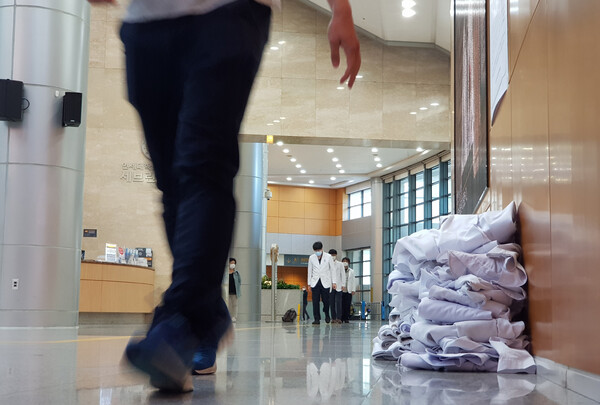Three large university hospitals have decided not to recruit interns and residents for the second half of this year, defying the government’s pressure to do so amid escalating conflict over next year’s medical school enrollment quota increase.
Seoul National University Hospital, the Catholic University of Korea Catholic Medical Center, and Korea University Medicine have decided not to recruit medical residents for the second half.

“We have decided not to apply to fill vacancies caused by the mass resignation of trainee doctors in the second half of the year,” said Professor Oh Seung-won, a media relations officer at the Seoul National University College of Medicine-Seoul National University Hospital Faculty Council Emergency Plan Committee, in a telephone interview with Korea Biomedical Review on Thursday. “I understand that our hospital has applied only for unfilled vacancies caused by personal reasons or non-replenishment unrelated to the doctor-government confrontation.”
The remark means that because the second half recruitment is “additional recruitment” for unfilled vacancies, the hospital would do so only when it meets that purpose.
“There were voices from all medical departments opposing massive new recruitment. This is because if we recruit new doctors in the second half of the year, there will be no place for resigned trainee doctors to return,” Professor Oh said.
The Catholic University of Korea Catholic Medical Center (CMC) and the Korea University (KU) Medicine also decided not to recruit for the fall turn. There are eight teaching hospitals under the CMC and three under the KU Medicine.
“We virtually decided not to pick fall-semester interns and residents (in the second half-year),” said Kim Sung-geun, head of the CMC Faculty Council’s emergency committee. “We discussed and gathered opinions across all clinical departments on Wednesday.”
“The fall recruitment is an additional one so it is up to the hospital to decide whether or not to proceed. It is a practice for hospitals to collect and announce the recruitment plan of each clinical department. There is no reason to break that practice,” he said. “Above all, additional recruitment will leave no place for resigned trainee doctors to return.”
Kim noted that the government is pressuring hospitals to recruit new medical residents by threatening to reduce the enrollment quota for 2025.
‘However, can the government say it would not give quota (for next year) when all the training hospitals in the country refuse to fill vacancies in the second half-year?” Kim said. “This is not the time for the government to pressure hospitals. They should try to solve the underlying problem.”
Park Pyeong-jae, co-chair of the Korea University College of Medicine Faculty Council, said, “The position of the emergency committee is that we should go in the direction of not recruiting for the second half of the year to protect the resigned trainee doctors. In a survey, 88 percent of professors said that we should not recruit interns and residents for the fall semester.”
Park said that even if the hospital recruits trainee doctors for the second half-year, applicants will be only 10 percent of the total quota.
“The number of applications submitted by the clinical departments of the three hospitals to the Education and Training Department as of Wednesday accounted for only 10 percent of the total enrollment quota,” Park said. “This is even with the expectation that some of the trainee doctors who have already resigned will return in the second half of the year.”
Park continued, “KU Medicine’s stance has been to follow the application from departments from the beginning,” Park said. “However, there is a risk of penalties, including a reduction in 2025 quota if we don't select this fall, so we are in constant discussion with the committee leadership.”
On the other hand, Asan Medical Center and Samsung Medical are reportedly pushing ahead with recruitment in the second half of the year despite their faculty’s opposition.
“Medical departments are opposing the fall recruitment internally, but the hospital is pushing ahead. The emergency committee’s position is that it should recruit at least the senior year residents,” said Choi Chang-min, chairman of the emergency committee of the Ulsan Medical University Faculty Council. “The emergency committee is planning to gather internal opinions through a survey of all faculty members.”
Related articles
- [Contribution] Misaligned relationship between the government and the medical community
- Has trainee doctors’ resignations even caused a blood supply glut?
- Junior doctors defy government's resignation deadline amid coercion claims
- Top hospitals tell trainee doctors to confirm return or resignation by July 15
- Government considers regional restrictions on trainee doctor applications starting September
- Ruling party bigwig calls for rediscussing medical student increase issue
- Teaching hospitals fire 7,648 trainee doctors, seek to hire 7,707 in autumn
- Resigned trainee doctors face difficulties finding jobs with halved paychecks

